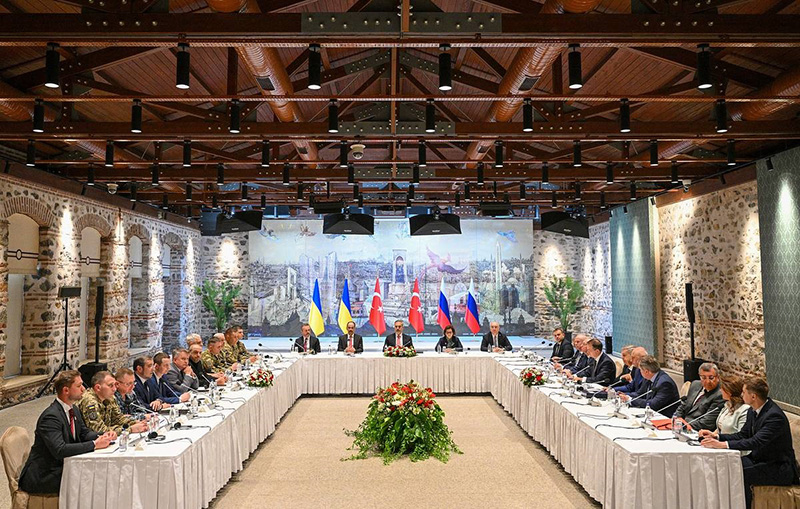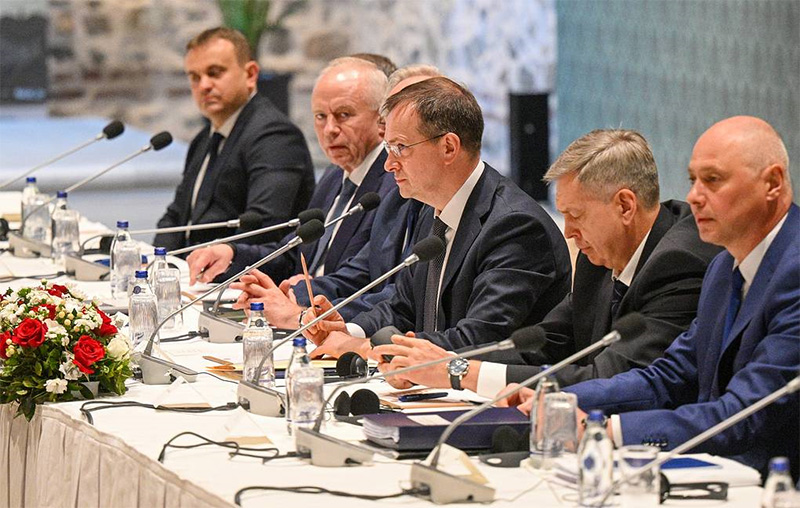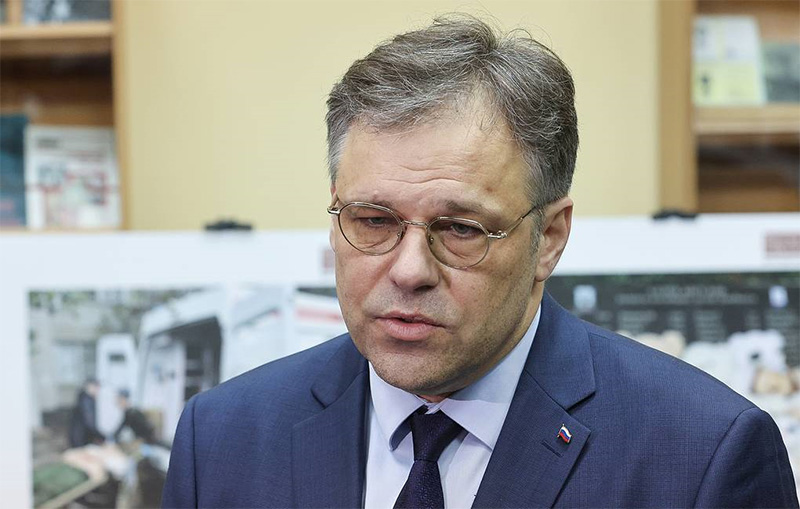 Russia-Ukraine talks in Istanbul, May 16, 2025.
Russia-Ukraine talks in Istanbul, May 16, 2025.
Photo: TASS
Russia and Ukraine wrapped up talks in Istanbul, Turkey. The sides agreed to exchange 1,000 prisoners of war from each country and present a vision of a potential ceasefire. The head of the Russian delegation, presidential aide Vladimir Medinsky, said he was satisfied with the outcome of the talks and Moscow is ready to continue communication.
On May 11, President Vladimir Putin, speaking to reporters in the Kremlin, suggested that the Kiev authorities resume without preconditions the direct talks Ukraine broke off in 2022, proposing to launch a dialogue on May 15 in Istanbul.
Russian Foreign Ministry Spokeswoman Maria Zakharova later said that the location that was chosen is significant: the talks are resuming where they were interrupted at the insistence of the United Kingdom, which pressured the Kiev regime to break off negotiations three years ago.
As reported earlier on Friday, the first direct talks between Russia and Ukraine since the spring of 2022 had kicked off in Istanbul.
Turkish Foreign Minister Hakan Fidan opened the talks with a welcome address.
TASS has put together key facts about the meeting.
 Russian delegation
Russian delegation
Photo: TASS
Statements by the Russian side
The head of the Russian delegation, presidential aide Vladimir Medinsky, said he was satisfied with the outcome of the talks and Moscow is ready to continue communication. The sides agreed to a 1,000 for 1,000 exchange of prisoners of war. According to Medinsky, Ukraine requested direct talks between the leaders of the countries and Russia took this "under advisement." Moscow and Kiev would present their vision of a possible ceasefire, with each side "spelling it out in detail." The head of the Russian delegation said the sides plan to continue negotiating.
The Russian delegation in Istanbul is in constant contact with President Vladimir Putin, Kremlin spokesman Dmitry Peskov told reporters.
"Our negotiating team [in Istanbul] is in constant contact. The President receives all information online, there are constant reports," the spokesman said when asked whether presidential aide Vladimir Medinsky additionally consults with the Kremlin, TASS quotes.
Statements by the Ukrainian side
The head of the Ukrainian delegation, Ukrainian Defence Minister Rustem Umerov, said Kiev primarily discussed a ceasefire. He also announced an agreement to swap 1,000 prisoners of war from each side. Umerov did not disclose further plans for talks.
About the talks
The meeting at the Dolmabahce Palace started at 1:35 p.m. on May 16 and lasted about two hours. It followed a three-way meeting between Turkey, the US and Ukraine and an engagement between the head of the Russian delegation, presidential aide Vladimir Medinsky, and the US team.
Medinsky led the Russian delegation, which also included Deputy Foreign Minister Mikhail Galuzin; the head of the Main Directorate of the General Staff of the Russian Armed Forces, Igor Kostyukov; and Deputy Defense Minister Alexander Fomin.
Also, the Russian team included experts, including Alexander Zorin, first deputy head of the information department at the General Staff of the Russian Armed Forces; Yelena Podobreyevskaya, deputy head of the Presidential Directorate for State Policy in the Humanitarian Area; Alexey Polishchuk, director of the Second Department of CIS countries at the Russian Foreign Ministry; and Viktor Shevtsov, deputy head of the Main Directorate for International Military Cooperation at the Russian Defense Ministry.
The Ukrainian delegation was led by Defense Minister Rustem Umerov. The team also included First Deputy Foreign Minister Sergey Kislitsa, Deputy Head of the Security Service of Ukraine Alexander Poklad, First Deputy Head of the Foreign Intelligence Service Oleg Lugovskoy, Deputy Chief of the General Staff of the Ukrainian Armed Forces Alexey Shevchenko, Deputy Head of the Main Intelligence Directorate Vadim Skibitsky, Deputy Chief of Staff of the Air Force Command Yevgeny Shinkaryov, Deputy Chief of Staff of the Navy Command Alexander Dyakov, Head of the Department of Intergovernmental Relations of the Ukrainian Armed Forces Alexey Malovatsky, head of the International and Operational Law Department of the Central Legal Department of the General Staff of the Ukrainian Armed Forces Alexander Sherikhov, senior officer of the Main Operational Department of the General Staff of the Ukrainian Armed Forces Georgiy Kuzmichev, protocol officer of the AFU Commander-in-Chief's Support Office; and Alexander Bevz, advisor to the chief of staff of the Ukrainian president's office.
 Rodion Miroshnik
Rodion Miroshnik
Photo: TASS
The Ukrainian delegation at the Istanbul talks with Russia is by 80% comprised of representatives from security structures which is indicative of the Kiev regime’s unwillingness to discuss any comprehensive political settlement, Rodion Miroshnik, the Russian Foreign Ministry’s ambassador-at-large in charge of overseeing the Kiev regime’s crimes, said in a conversation with TASS.
"The makeup of the Ukrainian delegation is rather symbolic: it is geared toward the matters of war, security and military operations. Because 80% of them are from security structures and only 20% are provisional politicians or diplomats. So the makeup of the delegation itself is showing that Ukraine is most likely getting ready to discuss the issues related to a ceasefire regime and will in every way try to ignore the issues related to the broader political settlement. It is precisely for this purpose that Deputy Foreign Minister Sergey Kislitsa was included in the delegation as he will prepare more stunts as a reaction or more staged provocative materials which he specializes in," the diplomat said.
According to him, Kislitsa is an "aficionado of cheap PR stunts who performed accordingly at the UN Security Council, flinging accusations, hype-inducing statements and so on at international venues." "It is probably hard to expect him to change his spots," Miroshnik emphasized.
"Among the security contingent, certainly, Alexander Poklad stands out, who, amid the revolutionary events of the coup d’etat, carved out a career for himself, rose through the ranks from a man with a criminal past to one of the leaders of Ukrainian special services. So practically all of Ukraine knows well his disingenuity, guile and ruthlessness," the envoy said.
In January 2023, the Wall Street Journal linked Deputy Chairman of Ukraine’s Security Service (SBU) Alexander Poklad to the assassination of Denis Kireyev, one of the participants of talks with Russia in February-March 2022.
According to Miroshnik, the large size of the Ukrainian delegation is explained by the fact that various agencies in that country do not trust each other and each tries to include its representative in the delegation. For example, the Ukrainian Defense Ministry Main Intelligence Directorate (GUR) is represented by the agency’s deputy chief Vadim Skibitsky.
"He is basically an enforcer from Kirill Budanov, the GUR’s head, in this negotiating group. Actually, to a great extent the group is so large because main competing Ukrainian agencies included their observers. And Vadim Skibitsky is representing specifically the GUR which is behind terrorist attacks and contract killings, that is, an entire list of war crimes where Skibitsky himself played one of the most important roles. And he is directly involved in a number of terror attacks organized by the Ukrainian side. So yes, he probably should be sitting on a bench, but not on a bench at the negotiating table. Nevertheless, this was the decision of the Ukrainian side which delegated such a character to the negotiating group," Miroshnik said.
read more in our Telegram-channel https://t.me/The_International_Affairs

 18:54 16.05.2025 •
18:54 16.05.2025 •






















